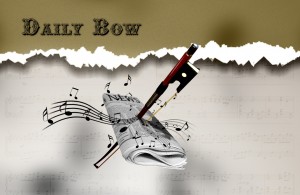
Classically trained musician Kyle Baker strives to reinterpret the way individuals interact with art and sound. His secret ingredient is technology.
That was the first line of an article I recently read. Kyle Baker’s entrepreneurial baby is Soundcrawl, an organization which purports to about present the best and brightest by highlighting their works in an “opt in” gallery format. In a sense, Baker’s mission is no different from Jacqueline Perrin and Classical Reinvention, who is also seeking to redefine classical music through the way it is presented, marketed, and branded. However, Baker takes a slightly different route, harnessing technology to create a new format for people to experience classical music and blending popular culture with classical music.
Baker seeks to translate the grandeur of musical performance into a new artistic medium: a performer and a laptop. No longer is a 60-piece orchestra necessary to deliver musical performances warranting standing ovations. By boiling down pomp but not sacrificing quality, Baker believes that music becomes “infinitely more performable.”
The entity that is Soundcrawl first appeared on the Nashville arts scene in October 2009 through a partnership with Art Crawl, an event held the first Saturday of every month at The Arcade and surrounding art galleries on Fifth Avenue. Baker introduced sound exhibits and new media installations that elevated audiences’ experiences to a multisensory affair with audio and visuals.
Sounds great. However, unlike Classical Reinvention, I have doubts that this is the way for classical music to go.
First of all, it must be said that very little information is available online about this initiative, which seems strange given its history with the Nashville arts scene since 2009. Both the article and Baker’s own website for Soundcrawl, offer surprisingly few details about how it all works and how it has worked in the past.
The article states that “[f]or all intents and purposes, he [Baker] functions as a musical curator, staging the scene for a revamped relationship between individuals and art.” In the above excerpt is mention of bringing the classical performance down to a performer and a laptop.
What exactly does that mean?
Does it mean that orchestral performances are to be simulated with one person and a computer?
Does it mean that chamber groups are to be replaced by groups of computer parts?
Does it mean that performers have been replaced by a curator?
I’m all for innovation, and I have no problem with new forms of music that utilize exciting and dynamic formats to present a unique experience. But that doesn’t mean you can call it classical music.
It may not be Baker’s intent to do so. The article itself claims that this is pop culture meeting classical music. But, the classical music element is nowhere to be found (outside of the fact the Mr. Baker is himself classically trained). Even Baker himself says on Soundcrawl’s own website that “Soundcrawl is a pop-up multimedia gallery that’s hosting an electronic music festival.”
That doesn’t mean they aren’t making an impact on new music though… since 2009 they have received 450+ works by 90 composers in 43 countries on 6 continents, and presented 72 to audiences in Nashville, Tennessee.
From Soundcrawl’s About page, an interview with a local radio station yielded this conclusion:
“In an industry town that polishes and packages its sound to perfection, it can’t be easy to get folks to rethink their ideas of what music is. But for composers Aaron Doenges and Kyle Baker, experimental digital sound like this is as vital a genre as country and bluegrass. That why they’ve launched Soundcrawl: Nashville — a festival featuring sound art by composers from all over the world.”
However, when it comes to classical music, the question to ask might be whether or not this method of “curation” can work… after all, in the other “innovative” approaches to presenting classical music that we’ve looked at recently, the central human element has remained largely the same. Soundcrawl, however, draws heavily on technology to remove some of the human aspect of the performance. While “classical” composers such as John Cage and Milton Babbit have incorporated various types of technology in their music, all of this begins to wander into territory that many would consider “not classical.”
In a time when classical music faces existential threats, something like this might not be the best direction for classical music as a genre to go, as it risks losing an essential piece of its identity.
What do you think?
Read the full story – Kyle Baker combines pop culture, classical music.














https://xo88.lifestyle